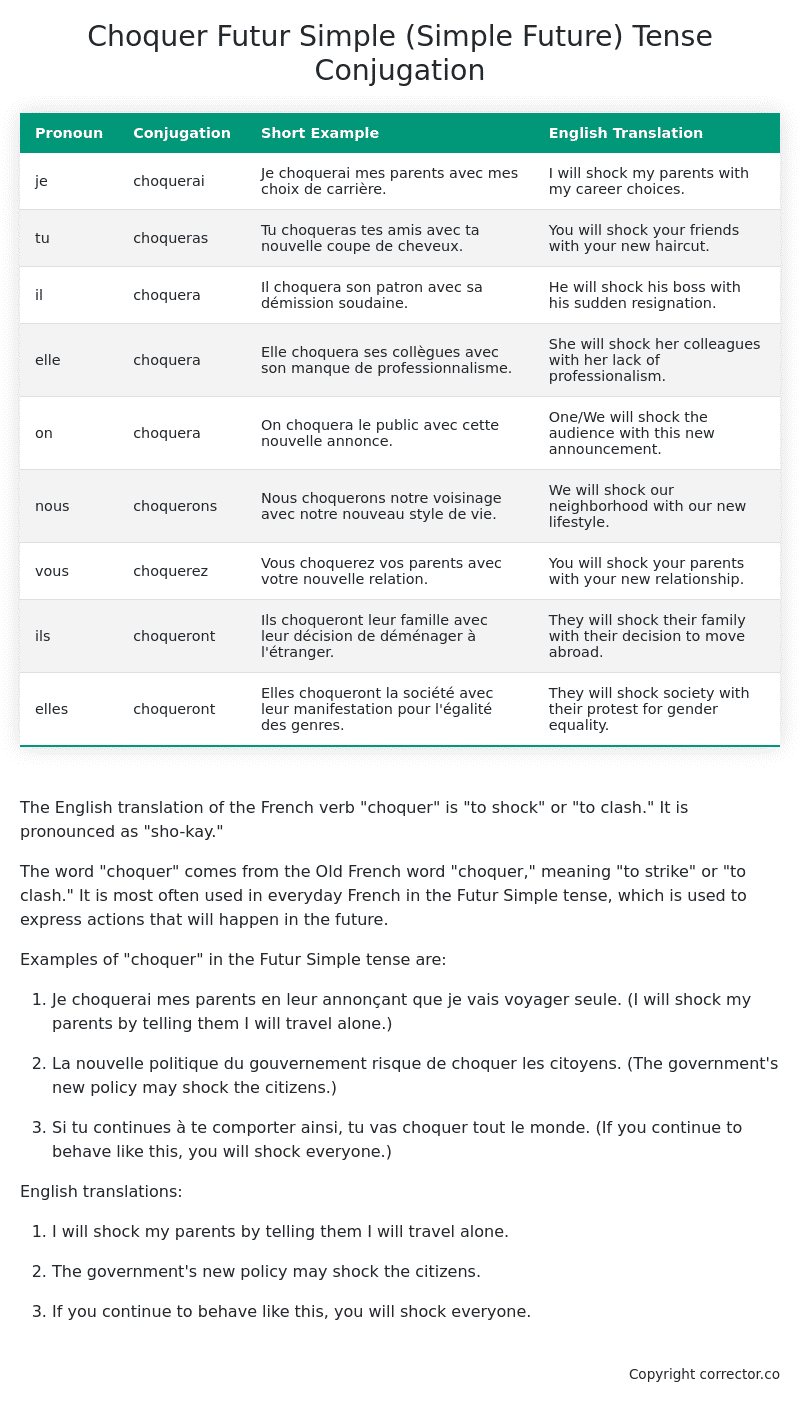Futur Simple (Simple Future) Tense Conjugation of the French Verb choquer
Introduction to the verb choquer
The English translation of the French verb “choquer” is “to shock” or “to clash.” It is pronounced as “sho-kay.”
The word “choquer” comes from the Old French word “choquer,” meaning “to strike” or “to clash.” It is most often used in everyday French in the Futur Simple tense, which is used to express actions that will happen in the future.
Examples of “choquer” in the Futur Simple tense are:
-
Je choquerai mes parents en leur annonçant que je vais voyager seule. (I will shock my parents by telling them I will travel alone.)
-
La nouvelle politique du gouvernement risque de choquer les citoyens. (The government’s new policy may shock the citizens.)
-
Si tu continues à te comporter ainsi, tu vas choquer tout le monde. (If you continue to behave like this, you will shock everyone.)
English translations:
-
I will shock my parents by telling them I will travel alone.
-
The government’s new policy may shock the citizens.
-
If you continue to behave like this, you will shock everyone.
Table of the Futur Simple (Simple Future) Tense Conjugation of choquer
| Pronoun | Conjugation | Short Example | English Translation |
|---|---|---|---|
| je | choquerai | Je choquerai mes parents avec mes choix de carrière. | I will shock my parents with my career choices. |
| tu | choqueras | Tu choqueras tes amis avec ta nouvelle coupe de cheveux. | You will shock your friends with your new haircut. |
| il | choquera | Il choquera son patron avec sa démission soudaine. | He will shock his boss with his sudden resignation. |
| elle | choquera | Elle choquera ses collègues avec son manque de professionnalisme. | She will shock her colleagues with her lack of professionalism. |
| on | choquera | On choquera le public avec cette nouvelle annonce. | One/We will shock the audience with this new announcement. |
| nous | choquerons | Nous choquerons notre voisinage avec notre nouveau style de vie. | We will shock our neighborhood with our new lifestyle. |
| vous | choquerez | Vous choquerez vos parents avec votre nouvelle relation. | You will shock your parents with your new relationship. |
| ils | choqueront | Ils choqueront leur famille avec leur décision de déménager à l’étranger. | They will shock their family with their decision to move abroad. |
| elles | choqueront | Elles choqueront la société avec leur manifestation pour l’égalité des genres. | They will shock society with their protest for gender equality. |
Other Conjugations for Choquer.
Le Present (Present Tense) Conjugation of the French Verb choquer
Imparfait (Imperfect) Tense Conjugation of the French Verb choquer
Passé Simple (Simple Past) Tense Conjugation of the French Verb choquer
Passé Composé (Present Perfect) Tense Conjugation of the French Verb choquer
Futur Simple (Simple Future) Tense Conjugation of the French Verb choquer (this article)
Futur Proche (Near Future) Tense Conjugation of the French Verb choquer
Plus-que-parfait (Pluperfect) Tense Conjugation of the French Verb choquer
Passé Antérieur (Past Anterior) Tense Conjugation of the French Verb choquer
Futur Antérieur (Future Anterior) Tense Conjugation of the French Verb choquer
Subjonctif Présent (Subjunctive Present) Tense Conjugation of the French Verb choquer
Subjonctif Passé (Subjunctive Past) Tense Conjugation of the French Verb choquer
Subjonctif Imparfait (Subjunctive Imperfect) Tense Conjugation of the French Verb choquer
Subjonctif Plus-que-parfait (Subjunctive Pluperfect) Tense Conjugation of the French Verb choquer
Conditionnel Présent (Conditional Present) Tense Conjugation of the French Verb choquer
Conditionnel Passé (Conditional Past) Tense Conjugation of the French Verb choquer
L’impératif Présent (Imperative Present) Tense Conjugation of the French Verb choquer
L’infinitif Présent (Infinitive Present) Tense Conjugation of the French Verb choquer
Struggling with French verbs or the language in general? Why not use our free French Grammar Checker – no registration required!
Get a FREE Download Study Sheet of this Conjugation 🔥
Simply right click the image below, click “save image” and get your free reference for the choquer Futur Simple tense conjugation!

Choquer – About the French Futur Simple (Simple Future) Tense
Formation of Futur Simple
For regular -er verbs (e.g., parler – to speak)
For regular -ir verbs (e.g., finir – to finish)
For regular -re verbs (e.g., vendre – to sell)
Common Everyday Usage Patterns
Conditional Statements
Interactions with Other Tenses
Futur Antérieur
Conditional
Present
Summary
I hope you enjoyed this article on the verb choquer. Still in a learning mood? Check out another TOTALLY random French verb conjugation!


